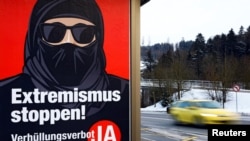Swiss citizens narrowly approved a referendum that would prohibit women from wearing full facial coverings in public, a controversial issue that has divided the country during an exceptionally heated campaign.
Campaigners, politicians and the media have dubbed it the “burka ban” even though the burka is not worn in Switzerland. The burka, a full body covering with a mesh screen to see through that is worn in Afghanistan has come to symbolize the oppression of women.
This is one of the messages figuring in a heated campaign leading up to Sunday’s vote. Campaign posters of a menacing-looking woman wearing a black niqab with only her eyes exposed reading “Stop Radical Islam” and “Stop Extremism” are plastered all over Switzerland.
Critics of the proposed ban call it deeply racist and sexist. They say it is an attack against the Muslim community and is aimed at stigmatizing and marginalizing this minority group even more.
The right-wing Swiss People’s Party, which supports the ban disagrees. It claims the burka initiative defends the dignity of women. However, Swiss parliamentarian Jean-Luc Addor acknowledges the campaign is calling for an end to what supporters see as the Islamization of Switzerland.
“This is something that we find shocking. It is fundamentally in opposition with various values of our civilization simply because, for us, free people show their faces in all circumstances outside, Addor said.”
The irony of demanding a ban on full-face coverings has not escaped many at a time when Switzerland’s 8.5 million people are obliged to wear masks to prevent the spread of the coronavirus.
The Swiss federal government opposes the proposal. Justice Minister Eveline Widmer Schlumpf says accepting the initiative would unnecessarily endanger religious peace in the country.
She says it would violate human rights, which are guaranteed under international conventions. Furthermore, she says passage of the initiative would tarnish Switzerland’s reputation as a country that values the protection of fundamental rights.
Debates about various symbols of Islam, including burkas and niqabs have been going on for years. In 2009, Swiss voters approved another Swiss People’s Party initiative to ban the building of minarets in the country.
Many people in Switzerland believe the proposed ban on full face coverings is much ado about nothing. They note only some 30 women in Switzerland wear the niqab. About half are Swiss converts to Islam and the other half are tourists who come to this Alpine country for vacation.




